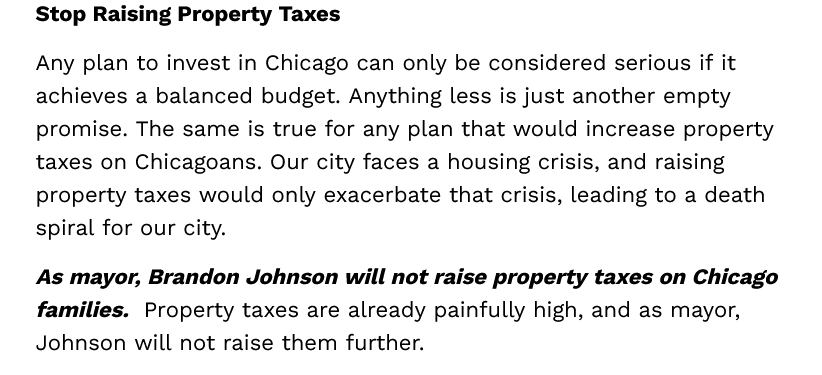
now raising property taxes 5% to the highest highest-allowed increase after he promised not to
Chicago Mayor is raising property taxes to the highest highest-allowed increase of 5%, or about $131 million breaking his campaign promise not to raise property taxes … As mayor, Brandon Johnson will not raise property taxes on Chicago families. Property taxes are already painfully high, and as mayor, Johnson will not raise them further … (Stop Raising Property Taxes , Tue, 23 Aug 2022 17:55:22 GMT https://www.brandonforchicago.com/issues/city-budget-and-revenue )
Property taxes are the schools system’s largest revenue source with state funding still falling about $1.4 billion short. But CPS-issued increases – a routine yearly occurrence – have often gone under the radar compared to those at the city level.
CPS is controled by the Mayor.
Wednesday, June 14, 2023 7:18AM
CPS boosts school budgets with focus on special education and more property taxes
By Nader Issa, Fran Spielman, Sun-Times Media Wire
CPS boosts budgets with focus on special education, property taxes
A Perryton, Texas tornado left 3 dead and about 100 injured as 20 million Americans from Kansas to Florida are on alert for severe weather Thursday.
A Perryton, Texas tornado left 3 dead and about 100 injured as 20 million Americans from Kansas to Florida are on alert for severe weather Thursday.
CHICAGO — Chicago is boosting funding for the vast majorityof its public schools next fall with a particular focus on special education – and with the help of its yearly property tax increase.
Please note: The above video is ABC7 Chicago’s live news stream
Overall, the school system’s spending will remain steady at $9.4 billion in the 2023-2024 school year, but more money will go directly to schools, figures released Tuesday show.
Buoyed in part once again by federal COVID-19 relief funding, Chicago Public Schools will spend about $220 million more in the 2023-2024 school year to hire teachers and other support staff as students continue their pandemic academic recovery. These budgets represent the funding the district is giving its principals, who will decide what staff to hire next school year.
CPS is also issuing its highest-allowed property tax increase of 5%, or about $131 million, to help support its budget. Property taxes are the schools system’s largest revenue source with state funding still falling about $1.4 billion short. But CPS-issued increases – a routine yearly occurrence – have often gone under the radar compared to those at the city level.
Most of the new money is going toward special education services, where CPS plans to add $126 million, granting about 85% of schools more special education funding. Officials said any special ed cuts are due to shifting enrollment. Special ed services have been troubled at CPS for years – and the district’s top official in that area resigned this week amid the department’s latest reprimand.
About 90% of 499 schools districtwide are getting more total funding next school year than the one that just ended, ranging from an additional $1,075 to $3.9 million. The remaining 10% of schools are facing cuts from $544 to $400,745, largely because of significant enrollment losses.
“This proposed budget is a step toward fulfilling CPS’ commitment to providing resources for every school community so that our students are healthy, safe, engaged and on the path to long-term success,” Johnson said in a statement. “This investment in our children is not only an investment in a stronger future for them and their families but is essential to living up to Chicago’s promise as a world-class city.”
To avoid ballooning the overall $9.4 billion budget – which also includes pension payments, central office staff salaries and expenses tied to CPS’ significant debt – officials presented a scaled-down $155 million capital budget plan that will address emergency facility needs to have schools ready for the fall. In past years, the capital plan was released later in the summer and detailed more substantial construction projects. Last year it was $765 million. Officials said they’ll present a plan for more capital funding later this year.
While 25 schools are facing cuts of at least $75,000, the increase in spending at most schools is welcome news compared to last year, when CPS faced protests over its funding allocations. Mayor Brandon Johnson was a Chicago Teachers Union official last year, and more recently campaigned on infusing under-resourced neighborhood schools with more funding. He had little time to influence a budget process that started late last year, months before he was inaugurated in May, but Johnson will be happy to to avoid trouble in his first major education announcement after teachers heavily backed his candidacy.
Johnson also vowed on the campaign trail that he would avoid raising property taxes that he claimed were squeezing the middle class out of Chicago. But the district is allowed to raise taxes by the lesser of inflation or 5% – and is again doing just that. Inflation this year was calculated at 6.5%, so CPS will take in a 5% – or $131 million – increase. That falls in line with previous years. CPS has raised property taxes every year for the last decade.
Johnson’s senior adviser Jason Lee portrayed the new mayor as powerless to stop the “tax-to-the-max” increase.
“The mayor didn’t appoint a single person on the school board. These aren’t the mayor’s appointees,” Lee said. “At the end of the day, there’s been a budget process that was operated under a different regime with different assumptions. Now, it’s the 9th inning. … This is the end of the budget process.
“This is not an act of the Johnson administration. … All we can do is look forward to the elected school board and whatever intermediary board that we have,” said Lee.
Enrollment has remained a big challenge and makes running schools more costly. The school system has had to grapple with plummeting student populations over the last two decades, falling from over 400,000 students to 322,000 this year.
CPS for the last 10 years has funded its schools on a per pupil basis – more students equals more money, and fewer kids means budget cuts. But the district has begun moving away from that formula – called student-based budgeting – in recent years in an attempt to stop harming schools that lose kids for factors outside their control, like population declines in their neighborhoods.
That shift continues in these new budgets, where 39% of the funding is allocated through student-based budgeting, down from 46% last school year.
Instead, CPS is adding money based on student needs and providing guaranteed funding for certain teaching and support positions. The district is also giving money to most schools that are losing students to soften that blow.
Similar to this last year, CPS officials prioritized smaller class sizes, limited split-grade classrooms, arts classes and intervention support to help kids through pandemic trauma and learning loss. More money is going toward hiring counselors, athletic directors, nurses and social workers.
“We’re grateful to be able to fund these priorities – this foundation for what all schools should and can expect to receive,” Chicago Public Schools CEO Pedro Martinez said in a statement.
CPS is hosting budget hearings from noon to 1:30 p.m. June 20; 6-7 p.m. June 21; and noon to 1:20 p.m. June 23. The Board of Education is expected to vote on the budgets at its June 28 meeting.
https://abc7chicago.com/chicago-public-schools-cps-budget-school-budgets/13378919/
BRANDON JOHNSON’S PLAN TO STOP PROPERTY TAX HIKES
https://www.brandonforchicago.com/issues/city-budget-and-revenue
